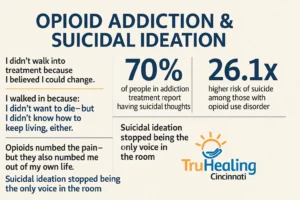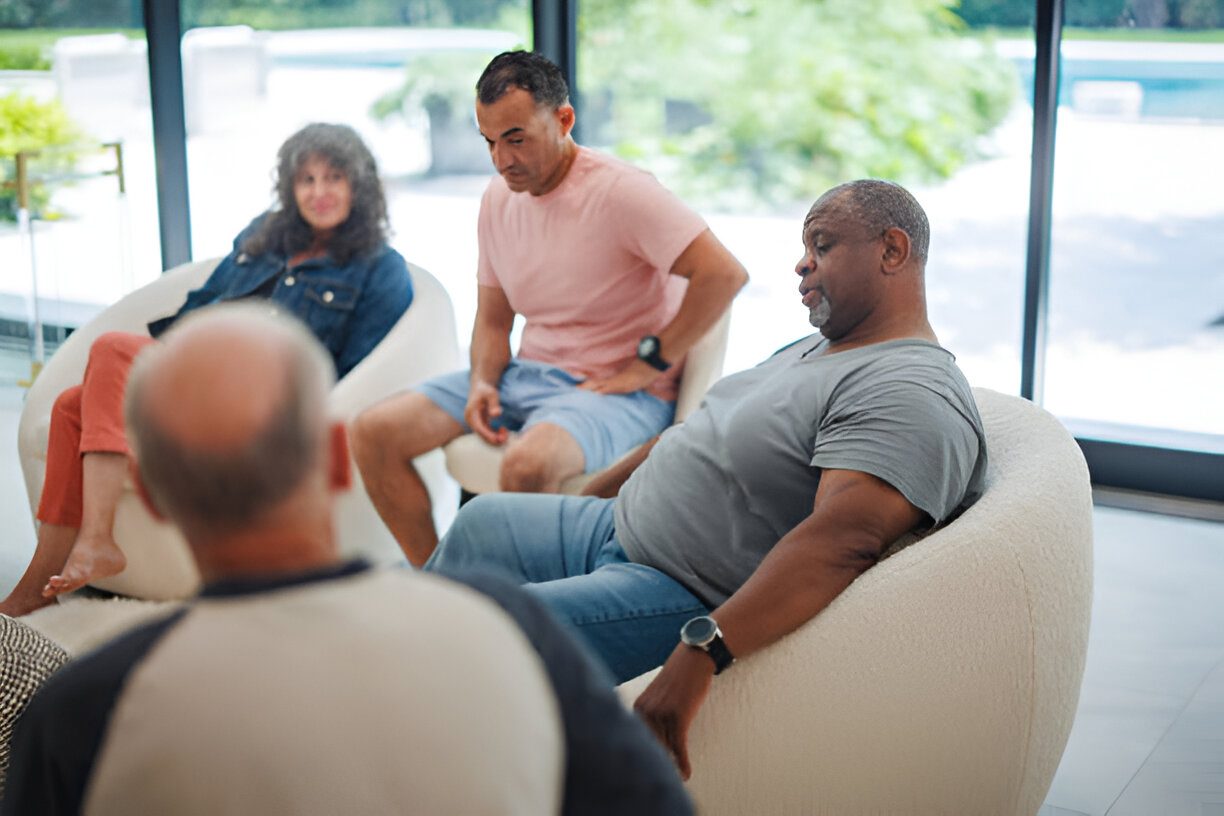I didn’t walk into treatment because I believed I could change.
I walked in because I didn’t want to die—but I didn’t know how to keep living, either.
There wasn’t some dramatic bottom. No overdose. No family ultimatum.
Just a long, slow unraveling where nothing made sense anymore. Days ran together. Nights dragged on. I stopped picking up my phone. I stopped picking up for myself.
I was using opioids every day, not to feel high—just to feel less.
Less overwhelmed. Less numb. Less like I was stuck in a life I didn’t remember choosing.
But after a while, even that stopped working. The pills couldn’t soften the edge anymore. I wasn’t suicidal in the way people talk about it—I didn’t write notes or make plans. I just… couldn’t picture a future. And the idea of not existing quietly began to feel like relief.
The Moment That Broke Through
It wasn’t some big event. No flashing red lights or intervention circle.
It was me in the shower, water running cold, thinking: “I can’t do this again tomorrow.”
Not because anything specific had happened. But because everything felt impossible.
Paying rent. Answering emails. Even getting dressed. All of it felt like lifting a car with my bare hands.
I didn’t want to kill myself. But I wanted everything to stop.
That was the difference that saved me.
I Didn’t Walk In Brave—Just Barely Breathing
When I showed up at the treatment center, I didn’t look like a “typical addict.” I still had a job, kind of. Still had a place to live. Still showered (sometimes). But I was completely disconnected from myself.
I remember sitting in the intake chair thinking, They’re going to laugh me out of here.
But they didn’t.
They asked questions gently. They didn’t force me to explain everything at once. And when I finally said, “I don’t know if I want to live,” they didn’t panic.
They nodded.
Like that made perfect sense.
Like they’d heard it before.
And that nod made more difference than anything I could’ve predicted.
What Opioid Addiction Treatment Actually Gave Me
It didn’t “fix” me. Let’s be clear.
The thoughts didn’t vanish. The depression didn’t lift overnight. But I stopped being alone in it.
What opioid addiction treatment in Cincinnati gave me was a space where I could say hard things—and people didn’t flinch.
I learned that suicidal thoughts aren’t always about dying. Sometimes, they’re just about needing everything to slow down. For someone to witness your pain without turning it into a crisis or a problem to solve.
Treatment gave me that.
Not because they had magic answers, but because they had structure, and care, and the patience to let me be where I was.

I Thought Opioids Were the Problem. They Were the Symptom.
Before treatment, I blamed the drugs. And yes, opioids were hurting me—but they were also hiding something bigger.
In therapy, I started to unpack what was underneath:
Old trauma. Buried grief. Perfectionism so thick I couldn’t breathe. A childhood that looked “fine” from the outside but never felt safe on the inside.
And slowly, with help, I started to understand:
Opioids numbed the pain. But they also numbed me out of my own life.
Recovery didn’t mean going back to who I was.
It meant learning who I could be without the fog.
There Were Still Days I Didn’t Want to Be Here
Even in treatment, I had dark days.
There were times I stared at the floor of my room, wondering why I was even bothering. Times I looked at the group schedule and thought, None of this matters.
But I also started having moments—tiny ones—where I felt present.
Laughing at someone’s dumb joke. Making eye contact in group. Finishing a meal without shame.
Those were the new data points. They didn’t replace the pain. But they started adding weight to the other side of the scale.
And eventually, the suicidal thoughts stopped being the only voice in the room.
Real Talk: The First Step Sucks
Walking into a treatment center while you’re still using, still scared, still half-convinced it won’t help—that’s one of the most vulnerable things you can do.
But I’ll tell you this:
If you’re feeling what I felt—like you don’t want to be gone, but you don’t know how to stay—you are not broken.
You’re overloaded. You’re human. And you are not the only one.
I met people in treatment from all over—Lexington, Lawrenceburg, downtown Cincinnati—people who had stories like mine, or nothing like mine, but pain that echoed.
I didn’t find a cure. But I found company.
FAQs: When You’re Suicidal and Considering Opioid Addiction Treatment
Can I get help if I’m having suicidal thoughts and using opioids?
Yes. You don’t have to hide either part of your struggle. In fact, opioid use and suicidal ideation often co-occur. A good treatment center—like TruHealing Cincinnati—knows how to handle both safely and compassionately.
Will I be hospitalized or “locked up” if I admit I’m suicidal?
Not necessarily. There’s a difference between suicidal thoughts and active plans. Many people in treatment have passive thoughts of not wanting to live. The staff at TruHealing will assess your safety and support you without judgment. You can be honest.
What’s the first day of opioid addiction treatment like?
It usually starts with intake: forms, questions, and a chance to talk about what’s been going on. You’ll meet staff, get oriented, and begin the process of stabilization—emotionally and physically. No pressure to spill everything at once.
What if I don’t want to stop using, I just don’t want to feel like this anymore?
That’s okay. You don’t need to be all-in. You just need to be open to trying something different. Many people start treatment unsure. Opioid recovery often begins with small shifts, not big declarations.
How can I pay for treatment?
TruHealing Cincinnati works with most major insurance providers and offers help navigating coverage. Call them directly or fill out a form online—they’ll walk you through your options.
If You’re Quietly Falling Apart, Read This
You don’t have to be on the edge of a bridge to need help.
You don’t have to have lost everything.
You don’t have to be certain you want recovery.
You just have to want something—anything—other than this.
If you’re in Cincinnati, or even nearby in Louisville, Lexington, or Lawrenceburg, there is a place that can hold the complexity of what you’re feeling. You won’t be treated like a problem. You’ll be treated like a person in pain who deserves care.
That’s what TruHealing Cincinnati’s opioid addiction treatment did for me.
Not fix me.
But meet me.
And some days, that’s more than enough.
If you’re tired of pretending you’re okay—and not ready to be gone—come talk to us.
Call (888) 643-9118 or visit TruHealing Cincinnati Opioid Addiction Treatment to learn how we can support you when things feel too heavy to carry alone.

